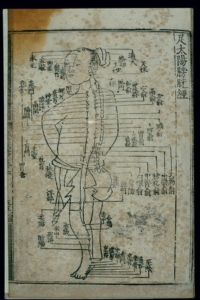26th August 2020 / /
Explanations of
Channels and Points Vol.1 –
Point Explanations VII
_______________________________________________________________________
The following post is an excerpt from《Explanations of Channels and Points Vol. 1》 [经穴解] translated by Michael Brown and edited by Allen Tsaur. It explicates the origin of point names from a new perspective and viewpoint.
The Bladder
_______________________________________________________________________
First Point of the Bladder Channel
Jīng Míng – Bright Eyes (BL-1)
注:睛之所以明者在瞳仁,而何以此穴爲睛明?蓋目雖爲五臓之所俱屬,而目獨爲肝之竅,然心猶爲目之本也,目眥乃心之部分,故以此穴爲睛明。禁灸者,恐火氣熏目也。此穴所治,皆治目病。
Explanation: that which enables the Jīng (Eye) to have Míng (Brightness) is the pupil, so, why is this point called Jīng Míng (Bright Eyes)? Although all five zàng-viscera adjoin to the eye, the eye is alone the orifice of the liver; moreover, the heart is root of the eye. The canthus of the eye is the area of the heart. Therefore, this point is called Jīng Míng (Bright Eyes). Moxa is contraindicated for the fear that the fire qì will fume the eyes. That which this point treats are all eye diseases.
Second Point of the Bladder Channel
Zan Zhú – Bamboo Gathering (BL-2)
膀胱經第二穴攢竹
注:此穴兩眉一蹙,有攢竹之形,故曰攢竹。禁灸者,恐火氣蒸於頭也。
Explanation: for this point, when the eyebrows are furrowed, it has the appearance of Zan Zhú (Gathered Bamboo), therefore it is called Zan Zhú (Bamboo Gathering). Regarding to the contraindicated use of moxa, this is due to the fear that the fire qì will steam the head.
Tenth Point of the Bladder Channel
Tiān Zhù – Celestial Pillar (BL-10)
膀胱經第十穴天柱
穴在挾項後髮際大筋陷中。《銅人》:鍼五分,得氣即泄。《明堂》:鍼二分,留三呼,泄五吸,灸不及鍼,日七壯至百壯。《下經》:灸三壯。《素》注:鍼二分,留六呼。
This point is located in the depression on the great sinew that clasps the nape at the posterior hairline. The Tóngrén states “needle 5 fēn, obtain qì then promptly drain.” The Míngtáng states “needle 2 fēn, retain for 3 respirations, drain for 5 inhalations, moxa is inferior to needling, moxa 7 to 100 cones every day.” The Xiàjīng states “moxa 3 cones.” The Sùzhù states “needle 2 fēn, retain for 6 respirations.”
注:天者,指首而言也。此穴緊在兩大筋之旁,以載夫首,有柱之象,故曰天柱。
Explanation: Tiān (Celestial) is indicating the head. This point is located closely beside the two great sinews, that hold up the head with an image of Zhù (Pillars), therefore it is called Tiān Zhù (Celestial Pillar).
天柱之本病:足不任身體,肩背痛欲折,腦痛如脱,項如拔,項强不可回顧,頭旋腦痛,頭風。
Principal diseases of Tiān Zhù: feet unable to bear [weight of] the body, shoulder and upper back pain as if they were about to break, painful brain as if about to burst, nape feels as if it were dislocated, stiffness of the nape with inability to look behind, spinning head and painful brain, head wind.
注:以上症皆邪入本穴部分,故責此穴。
Explanation: the above signs are all due to evil entering the vicinity of this point, therefore seek this point.
天柱之肺病:鼻不知香臭。
Lung disease of Tiān Zhù: inability to differentiate smells.
注:此穴入風上通於鼻,而有是症,故責之。
Explanation: when wind enters at this point, it is able to reach the nose and resulting in this sign, therefore seek this [point].
Twelfth Point of the Bladder Channel
Fēng Mén – Wind Gate (BL-12)
膀胱經第十二穴風門
一名熱府
Alternate name: Heat Administration
穴在第二椎下兩旁,相去脊中各一寸五分,正坐取之。《銅人》:鍼五分。《素》注:鍼三分,留七呼。《明堂》:灸五壯。
This point is located beside and below the second vertebra, 1 cùn 5 fēn from the middle of the spine, on each side, sit upright to locate it. The Tóngrén states “needle 5 fēn.” The Sùzhù states “needle 3 fēn, retain for 7 respirations.” The Míngtáng states “moxa 5 cones.”
注:天之邪風中人也,多在於上,而人之背尤易中風,然必有竅焉,以招其中。故在督之中行,於項之側,足少陽之經,則曰風池,與此經之在背者,則又有風門焉。
Explanation: when the wind evil of heaven strikes a person, it frequently [strikes] in the upper region; moreover, the upper back of a person is especially susceptible to be struck by wind. Evidently, there must be an opening here that invites [the wind] to strike. Thus, on the dū [channel] on the midline, [there is Fēng Fǔ (Wind Administration, DU-16)]. On the side of the nape, on the channel of the foot shàoyáng, there is Fēng Chí (Wind Pool, GB-20). Together with this channel, [they are all] located on the upper back, thus there is also Fēng Mén (Wind Gate) here.

For more information about the book please view the interview by Chinese Medicine Podcast, entitled: ‘Searching for the Truth, a discussion on Chinese Medicine Study with Michael Brown‘ under the following link:
_____________________________________
Post-Scriptum: The book is available on amazon under the following link:
PPS: Vol. 2 will be released next year.
PPPS: Pictures are from wellcomecollection.org
